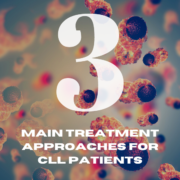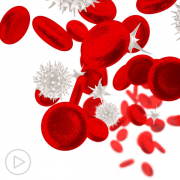MPN Essential Testing | How Results Impact Care & Treatment Options
MPN Essential Testing | How Results Impact Care & Treatment Options from Patient Empowerment Network on Vimeo.
How could molecular testing affect MPN treatment decisions? Dr. Raajit Rampal explains the purpose of this essential testing and how the results may impact prognosis and care.
Dr. Raajit Rampal is a hematologist-oncologist specializing in the treatment of myeloproliferative neoplasms (MPNs) and leukemia at Memorial Sloan Kettering Cancer Center in New York City. Learn more about Dr. Rampal.
Related Programs:

|

Understanding MPN Treatment Options | What’s Available for MF, PV, and ET? |

Understanding and Managing Common MPN Symptoms and Side Effects |
Transcript:
Katherine Banwell:
Let’s talk about what sort of tests should be done following an MPN diagnosis. Can you tell me about those?
Dr. Raajit Rampal:
Yeah. Fundamental to the MPN itself, the things that we really want to know is, in most cases, a bone marrow examination is needed because that will tell us really what the disease is that we’re dealing with. It will tell us about the genetics. I strongly believe we have to be comprehensive in our genetic assessments because that does prognosticate and sometimes gives us an opportunity in terms of treatment. Chromosomal analysis. These are the basic bread and butter hematology tests we want to do from the bone marrow to really understand what the patient’s disease is.
Beyond that, I think that particularly in patients with PV and ET, it’s important that we partner with their primary care physicians to make sure that they’ve had, for example, testing for diabetes, a recent lipid profile, any cardiovascular tests, particularly measurements of blood pressure because these things are all important in terms of an ET or PV patient’s risk of having a blood clot. So, there are, again, things that are within hematology realm but then, there are other general health things that become really important in somebody who is diagnosed with PV or ET.
Katherine Banwell:
How often should lab tests of blood work be done?
Dr. Raajit Rampal:
It really depends on the patient. For some patients with PV, for example, they need to have their blood checked every three weeks because they’re having frequent phlebotomies. Whereas some patients with ET could probably go forward to six months between blood tests. So, it depends on the individual.
Katherine Banwell:
How can results of biomarker testing affect treatment choices for patients with MPNs?
Dr. Raajit Rampal:
Great question. The genetics are becoming increasingly important in our treatment decisions. So, let’s take a simple example, which is patients with ET. Calreticulin and JAK2 and MPL are the three most common mutations that we see. But they have very different invocation. So, somebody could have a calreticulin-mutated ET and based on them having that calreticulin mutation and no other factors like no history of clotting, that patient may never need to go on a medication aside from aspirin. And even early on, it’s debatable whether or not some of these patients really need aspirin at all.
Whereas somebody who had a JAK-2 mutant ET, our guidelines and data suggests that that person, once they reach a certain age, should probably be on medication. So, that’s kind of perhaps one of our more clearcut examples of a genetic biomarker telling us how to approach treatment.
And then, it gets more nuanced from that and more exciting and interesting in the sense that there are mutations, for example, that occur in myelofibrosis and in patients whose disease is progressing towards leukemia, such as IDH mutations. And these are things that are now targetable with FDA-approved drugs.
And there are now clinical trials combining JAK inhibitors and IDH inhibitors for patients who have more advanced disease who have these IDH mutations. So, you go from on one end, these genomic markers being of prognostic significance and now, on the other hand, we’re getting to a point where, in some cases, they might tell us how to best treat a patient.
Katherine Banwell:
Dr. Rampal, should all patients diagnosed with MPNs undergo molecular testing?
Dr. Raajit Rampal:
I strongly believe that. I think that we’ve learned so much that these tests have prognostic value.
And in some cases, it may suggest a slightly different diagnosis. I definitely think that should be the case.
Katherine Banwell:
What should patients be asking once they have the results?
Dr. Raajit Rampal:
What does it mean? That’s the most basic and fundamental question. It’s one thing to get a list of mutations. But the real bread and butter question is what does this mean to the disease and my prognosis and my treatment? Those are the key questions.










